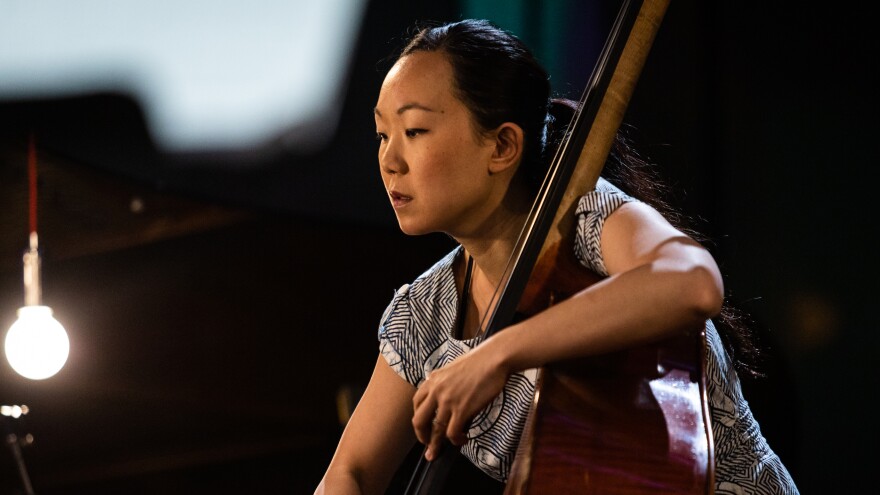Linda May Han Oh and Erin Gee travel in distinct creative orbits: Oh as a virtuoso bassist, composer and bandleader on the progressive end of jazz, and Gee as a renegade vocalist, conceptualist and composer expanding the sonic and technical palette of the human voice. But each artist has reached high distinction in her field — including, as of this week, the Herb Alpert Award in the Arts, now in its 29th year.
The 2023 awards — in the disciplines of dance, theater, film and video, and visual arts as well as music — were announced in a virtual ceremony on Wednesday. Each awardee will receive a $75,000 unrestricted prize and a residency at the California Institute of the Arts, which administers the prize on behalf of the Herb Alpert Foundation.
“This is life-changing,” said Oh during the ceremony, speaking from the Berklee College of Music, where teaches in the bass department and at the Berklee Institute of Jazz and Gender Justice. “I’m so inspired to create more, to push myself and to challenge myself more than ever.”
Born in Malaysia, raised in Western Australia and now based in New York City, Oh has been a dynamic presence in improvised music for more than a dozen years. Her expansive list of collaborators includes at least one past Alpert Award recipient, pianist and composer Vijay Iyer. Her most recent album, Aventurine, merges a modern jazz combo and a string quartet.
On a forthcoming release, The Glass Hours, she ventures into new territory, singing in harmony with Sara Serpa, in an ensemble that also includes Mark Turner on tenor saxophone, Obed Calvaire on drums, and Oh’s partner in life as in music, Fabian Almazan, on piano.

Gee — also a Guggenheim fellow, a Rome Prize Fellow and a Radcliffe Fellow — is an associate professor of music at Brandeis, where she teaches both theory and composition. She is best known for a series of works she calls The Mouthpieces, notated using the International Phonetic Alphabet and rooted in non-semantic vocal utterances.
Beginning with a single solo piece she performed as a graduate student in 2000, the series has expanded to orchestral and operatic dimensions, as well as multiple variations on chamber scale. By way of example, here is “Mouthpiece 28” as performed by TAK Ensemble, with Charlotte Mundy executing the vocal part.
“It is such an honor to be a part of this group of artists,” remarked Gee during the ceremony. “I am inspired by and grateful for Herb Alpert’s vision and dedication to supporting artists in all fields. It is such an honor to be selected by this panel whose work I truly admire.”
The music panel for the 2023 Alpert Awards consisted of three past recipients, all composers: clarinetist Derek Bermel, flutist Nicole Mitchell, and vocalist and performance artist Pamela Z. Each spoke briefly about this year’s awardees. Introducing Gee, Pamela Z focused on the groundbreaking qualities of her work: “Virtuosic as both composer and vocalist, she has, through a focused and sublime aural imagination, traversed and expanded vast realms of vocal sound — creating microworlds brimming with nuanced and fresh colors.”
The other Alpert Awards recipients included tap dancer Ayodele Casel and the contemporary duo Makini [jumatatu m. poe] and Jermone Donte Beacham; filmmakers Madeleine Hunt-Ehrlich and Christopher Harris; theatrical artists Whitney White and Tania El Khoury; and visual artists Park McArthur and American Artist. During the ceremony, which included remarks by Herb Alpert and Lani Hall, the Alpert Awards director Irene Borger approvingly cited remarks made by the novelist and critic John Berger, on receiving the 1972 Booker Prize.
“If a prize only stimulates conformity, it merely underwrites success as it is conventionally understood,” Berger said. “It constitutes no more than another chapter in a success story. If it stimulates imaginative independence, it encourages the will to seek alternatives. Or, to put it very simply, it encourages people to question.”


